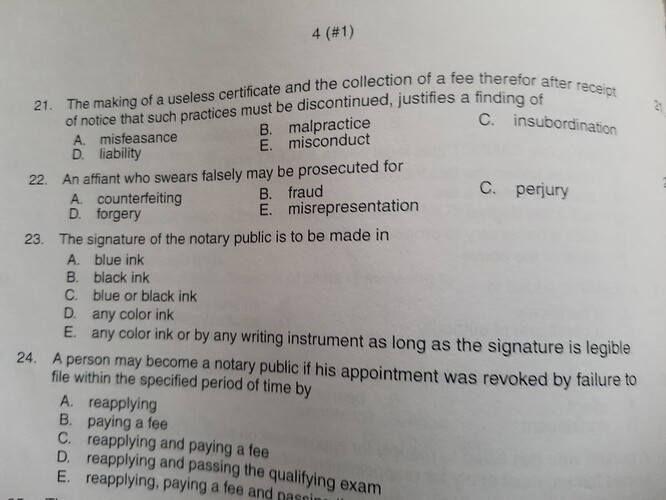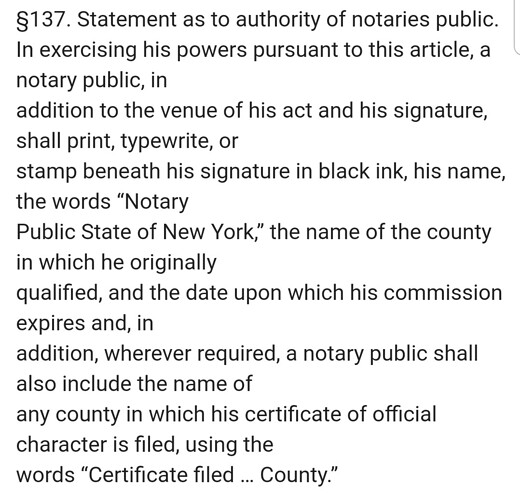Question 23 the booklet says answer is B. How is that possible? Everyone signs in Blue. This test booklet is wrong.
Well, first of all, we’re not going to help you pass your test, but their answer is not necessarily wrong.
Where are you located?? Some states require notary certs be completed in all black ink, some don’t specify as long as the certificate is legible and photographically reproducible. I would refer you to your notary handbook and state laws for the correct answer.
I infer @nypatriot is in the State of New York, which can see if I climb the hill across the street. New York State does not have a notary handbook.
I am in New York. I will post a picture of the statute as soon as I get home. The statute is vague and ambiguous. My dad is an attorney in New York and he’s always does his notary signings in Blue Ink. Besides, what state in their right mind wouldn’t allow signing in blue ink. It helps distinguish against photocopies.
From your laws - https://dos.ny.gov/system/files/documents/2022/03/notary.pdf
Please note…your Dad is an attorney - you don’t say if you are or are not…so assuming you are not
§137. Statement as to authority of notaries public.
In exercising his powers pursuant to this article, a notary public, in
addition to the venue of his act and his signature, shall print, typewrite, or
stamp beneath his signature in black ink, his name, the words “Notary
Public State of New York,” the name of the county in which he originally
qualified, and the date upon which his commission expires and, in
addition, wherever required, a notary public shall also include the name of
any county in which his certificate of official character is filed, using the
words “Certificate filed … County.”
Where it says “black ink” does that mean what follows or what precedes it?
Besides, my dad has been doing it wrong for 40 years? Sounds odd. If indeed this is true than the statute needs changing.
No Sir - as an attorney your Dad falls under a different set of rules. Click on the link and read the entire statute. I just provided the pertinent section for you.
Like in CT, attorneys can notarize as Commissioner of the Superior Court - attorneys can notarize in NY but under a slightly different set of rules.
Go read your statutes…that will help you.
Good luck
You’re extremely condescending. “Go read your statutes” as if I haven’t read it. I HAVE read the statute before I posted and I think their is a possibility that what follows “black ink” is what it pertains to. Even if youbl and the statute says black ink only tell me whether you think it should include blue ink as well.
I believe @LindaH-FL was trying to encourage you to do your research by directing you to read the handbook for yourself instead of taking her word for it. She is a regular contributor to this form and have always provided great resources and answers.
I am certain that it was not her intention to come across as you stated as “ condescending‘. I did not get that from her response.
I wish you well as you continue to do your own research to find the answers that you need.
@donaldsonnp is correct - I did not mean to be condescending, just as I’m sure you don’t mean to be argumentative… I was simply directing you to the New York state statute for your reference and for you to draw your own conclusions. Additionally, maybe it would help you if you took the statute to your Dad and got his advice on its interpretation.
What I think of a statute as to how it is and how it should be is irrelevant - it is what it is…and that’s what is followed.
On that note, I have no more input on this matter. Best of luck to you.
It’s relevent because I’m going to complain and lobby the Secretary of State to have this changed.
As you understand it, the statute says that notary signatures must be in black ink? Asking your honest opinion.
I have no opinion on the matter.
Signing in blue ink helps prevent against fraud because it is easily distinguishable against a photocopy, would you agree with that?
Yes I would agree to that statement. However with color copies now being so clean it’s hard to even hang your hat on that also.
I’m guessing this is a test for your state of New York, only? In Florida we can any color of ink as long as the stamp is black. But most of us all use blue. Your state notary laws must state somewhere that either black or blue or both is allowed by law for notary work. And if the answer is black, it’s black even though it makes no sense to you (or me).
I don’t know if that helps? When I do refi’s for other states and they want only black ink I HATE it! I’ve trained my eyes to only see blue ink to make sure all 10 elements are in my notary block. Black ink in my “space” freaks me out! Hahaha! ![]()
I may have misread the citation of the statute shown here. It seems that the state does not allow text to be written in blue ink, but does not say which signature color is acceptable. In the absence of that, I would think that either color would be acceptable for a signature unless the question was based on use or custom instead of a definitive statute.
Yes this is for my test in New York. My Internet searches are coming in accordance with you. States allow for blue ink signatures but the stamp must be black.


